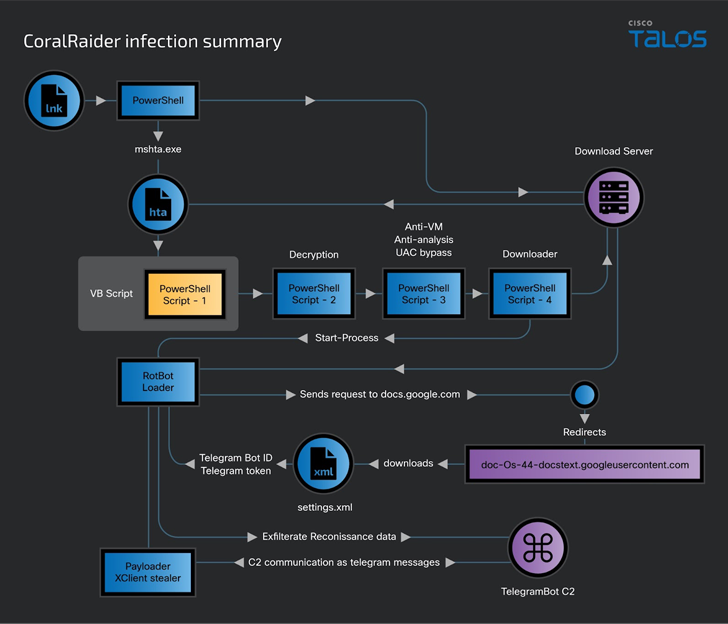

A suspected Vietnamese-origin menace actor has been noticed concentrating on victims in a number of Asian and Southeast Asian international locations with malware designed to reap precious information since a minimum of Could 2023.
Cisco Talos is monitoring the cluster underneath the title CoralRaider, describing it as financially motivated. Targets of the marketing campaign embody India, China, South Korea, Bangladesh, Pakistan, Indonesia, and Vietnam.
“This group focuses on stealing victims’ credentials, monetary information, and social media accounts, together with enterprise and commercial accounts,” safety researchers Chetan Raghuprasad and Joey Chen mentioned. “They use RotBot, a custom-made variant of Quasar RAT, and XClient stealer as payloads.”
Different commodity malware utilized by the group includes a mix of distant entry trojans and knowledge stealers comparable to AsyncRAT, NetSupport RAT, and Rhadamanthys.

The concentrating on of enterprise and commercial accounts has been of specific focus for attackers working out of Vietnam, with varied stealer malware households like Ducktail, NodeStealer, and VietCredCare deployed to take management of the accounts for additional monetization.
The modus operandi entails using Telegram to exfiltrate the stolen info from sufferer machines, which is then traded in underground markets to generate illicit revenues.
“CoralRaider operators are based mostly in Vietnam, based mostly on the actor messages of their Telegram C2 bot channels and language desire in naming their bots, PDB strings, and different Vietnamese phrases hard-coded of their payload binaries,” the researchers mentioned.
Assault chains begin with a Home windows shortcut file (LNK), though there’s presently no clear clarification as to how these information are distributed to the targets.

Ought to the LNK file be opened, an HTML utility (HTA) file is downloaded and executed from an attacker-controlled obtain server, which, in flip, runs an embedded Visible Fundamental script.
The script, for its half, decrypts and sequentially executes three different PowerShell scripts which might be liable for performing anti-VM and anti-analysis checks, circumventing Home windows Person Entry Management (UAC), disabling Home windows and utility notifications, and downloading and operating RotBot.
RotBot is configured to contact a Telegram bot and retrieve the XClient stealer malware and execute it in reminiscence, finally facilitating the theft of cookies, credentials, and monetary info from internet browsers like Courageous, Cốc Cốc, Google Chrome, Microsoft Edge, Mozilla Firefox, and Opera; Discord and Telegram information; and screenshots.
XClient can be engineered to siphon information from victims’ Fb, Instagram, TikTok and YouTube accounts, gathering particulars concerning the fee strategies and permissions related to their Fb enterprise and adverts accounts.
“RotBot is a variant of the Quasar RAT consumer that the menace actor has custom-made and compiled for this marketing campaign,” the researchers mentioned. “[XClient] has intensive information-stealing functionality by means of its plugin module and varied modules for performing distant administrative duties.”

The event comes as Bitdefender disclosed particulars of a malvertising marketing campaign on Fb that is making the most of the thrill surrounding generative AI instruments to push an assortment of knowledge stealers like Rilide, Vidar, IceRAT, and a brand new entrant often known as Nova Stealer.
The start line of the assault is the menace actor taking up an current Fb account and modifying its look to imitate well-known AI instruments from Google, OpenAI, and Midjourney, and increasing their attain by operating sponsored adverts on the platform.
One is imposter web page masquerading as Midjourney had 1.2 million followers earlier than it was taken down on March 8, 2023. The menace actors managing the web page have been primarily from Vietnam, the U.S., Indonesia, the U.Ok., and Australia, amongst others.
“The malvertising campaigns have super attain by means of Meta’s sponsored advert system and have actively been concentrating on European customers from Germany, Poland, Italy, France, Belgium, Spain, the Netherlands, Romania, Sweden, and elsewhere,” the Romanian cybersecurity firm mentioned.
